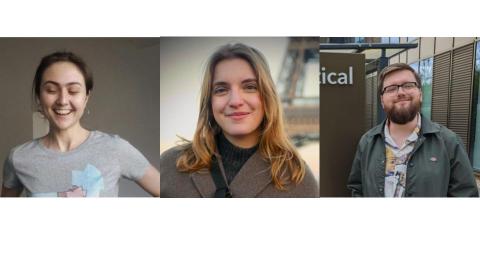JUNIPER welcomes first awardees of new fellowship scheme focused on supporting early career researchers

Three promising early career researchers from the JUNIPER partnership have been awarded fellowships as part of a new scheme recognising their role in our network and their potential to make a significant contribution to the epidemic modelling community in the near future.
The JUNIPER fellowship scheme was launched in summer 2025 with the aim of supporting early career epidemic modellers to develop leadership skills and grow their research network as they transition to becoming independent researchers. Fellows will help lead research activities within the JUNIPER partnership, undertake research visits to relevant JUNIPER members and input into the longer term strategic vision for the partnership. They will also work with the Plus magazine team to develop skills in communicating their work to non-experts.
The first awardees are:
Dr Joe Hilton from the University of Manchester, who is interested in the role of population heterogeneity in different aspects of public health, ranging from household-level patterns of viral transmission to risk-stratified screening and treatment programs for non-communicable diseases. Joe plans to lead activities in JUNIPER that bridge the gap between health economics and mathematical epidemiology.
Dr Katharine Sherratt from the London School of Hygiene and Tropical Medicine, who is interested in evaluating collaborative “team science” approaches to modelling work during outbreaks of infectious disease. Katharine plans to lead a theme of work based around model evaluation, working across the JUNIPER network to better understand common challenges in evaluating model outputs.
Dr Emilie Finch from the University of Cambridge, who is interested in developing statistical and mathematical models to understand the role of population immunity, human behaviour and climate in driving viral transmission. During the fellowship Emilie plans to lead activities on the theme of integrating novel data streams within epidemic models.
"We have been impressed so many times in so many ways by the calibre of the early career researchers who engage with JUNIPER" said Julia Gog, co-lead of the JUNIPER partnership. "We are just so lucky to have this facet to our community and we’re excited for what this means for the future of our field. These first three JUNIPER fellowships exemplify all of this, and we’re delighted to be able to recognise them in this way. We hope that the JUNIPER fellowship scheme will provide the extra support and network to help these researchers make the next steps to becoming leaders in our field."
This was the first round of the JUNIPER fellowship scheme, and it was highly competitive showing the strength of early career researchers in the field. We plan to further rounds of fellowships, with the next call for applications planned for January 2026. More information about the fellows is available here: https://maths.org/juniper/fellows .
